Early Childhood Education: Legal and Ethical Responsibilities Report
VerifiedAdded on 2023/05/28
|6
|956
|53
Report
AI Summary
This report, prepared for an early childhood education course, delves into the legal and ethical responsibilities of educators. It begins with an overview of the educator's role, emphasizing the obligation to educate and ensure children's safety. The report outlines overarching responsibilities, including education, certification, and program development. It identifies potential legal issues such as licensing and employment laws, as well as ethical concerns like confidentiality and justice. Strategies to address these issues are proposed, including re-evaluation provisions for licensing and documentation for performance issues. Furthermore, the report explores opportunities for improvement in work practices, like addressing knowledge deficiencies and the risks to quality, such as inadequate training. The report concludes with a list of references used in the analysis.
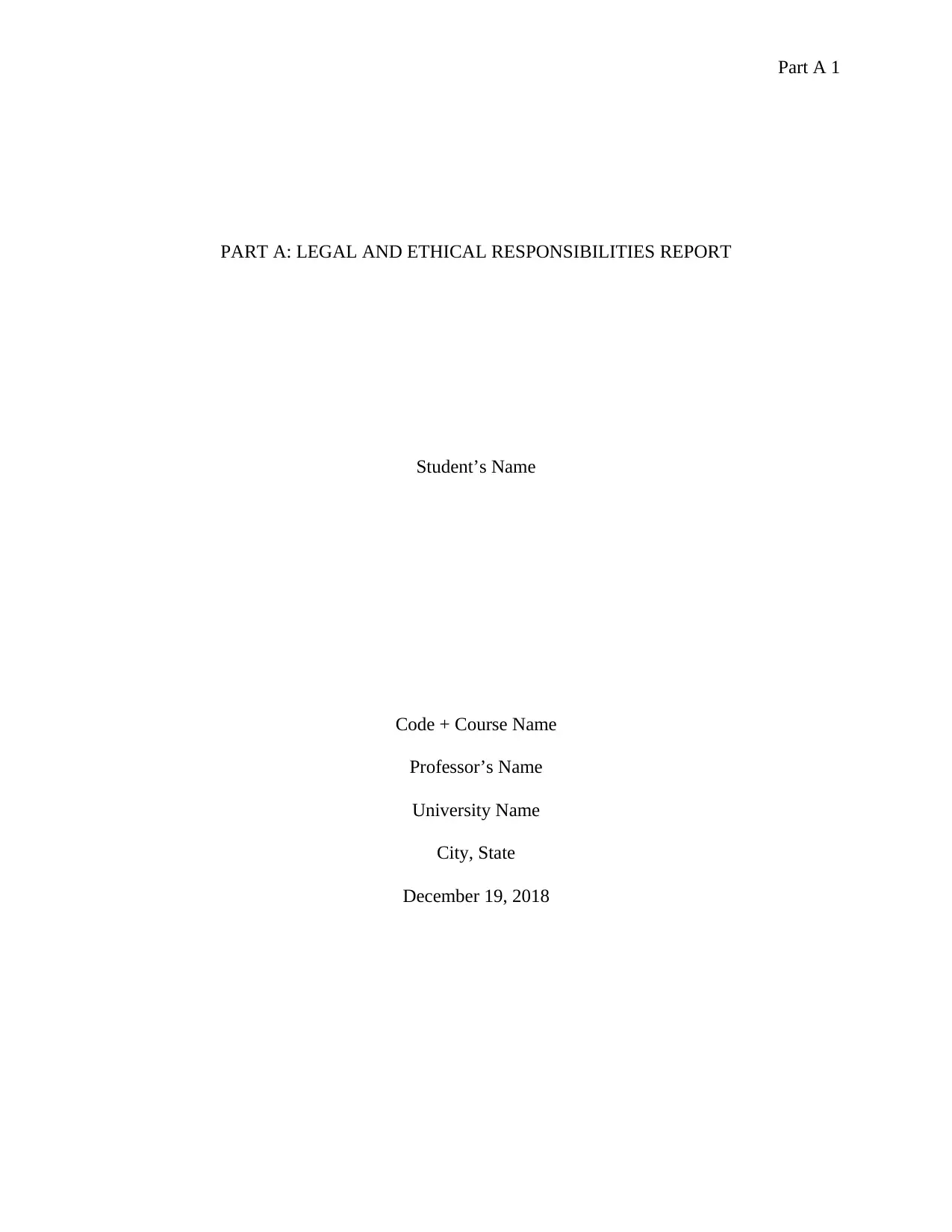
Part A 1
PART A: LEGAL AND ETHICAL RESPONSIBILITIES REPORT
Student’s Name
Code + Course Name
Professor’s Name
University Name
City, State
December 19, 2018
PART A: LEGAL AND ETHICAL RESPONSIBILITIES REPORT
Student’s Name
Code + Course Name
Professor’s Name
University Name
City, State
December 19, 2018
Paraphrase This Document
Need a fresh take? Get an instant paraphrase of this document with our AI Paraphraser
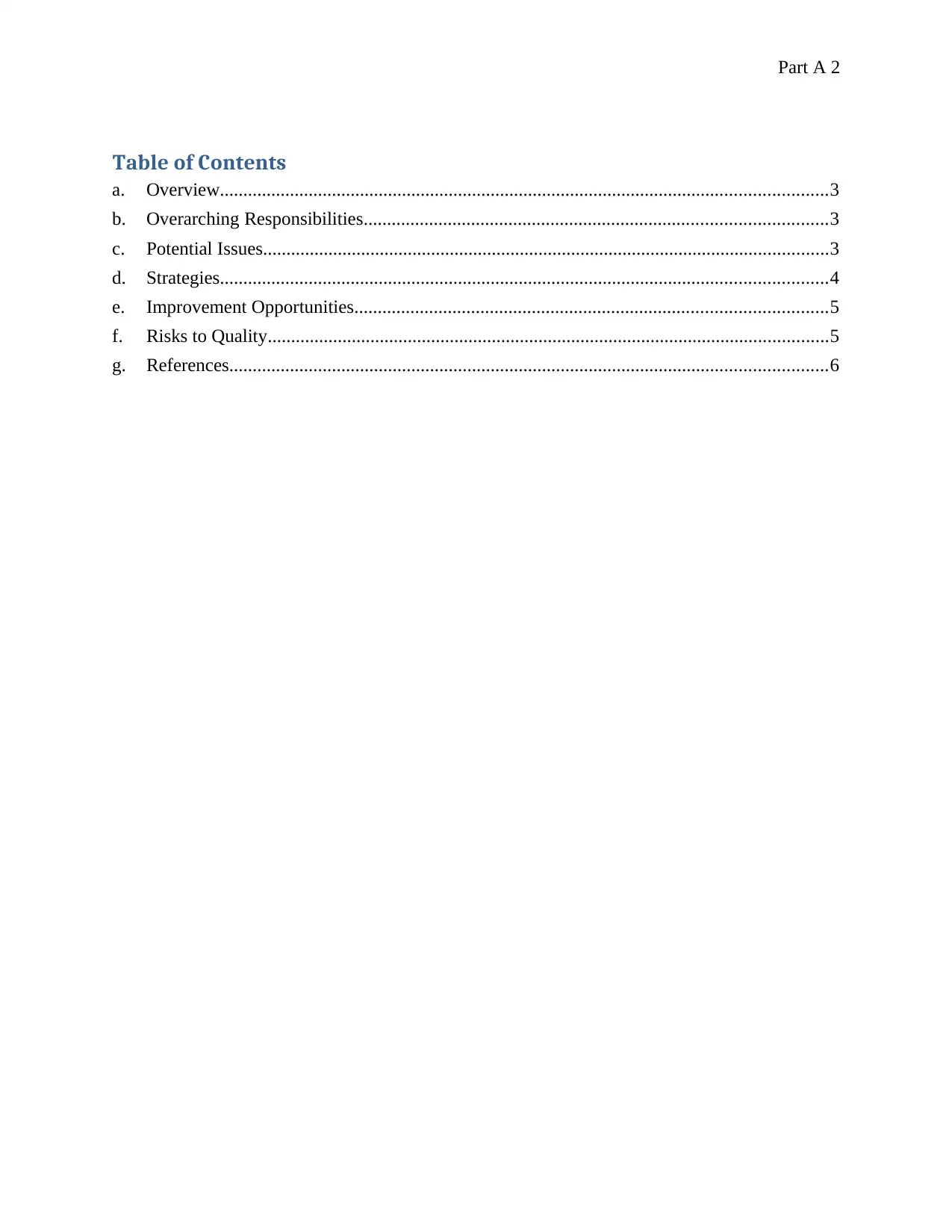
Part A 2
Table of Contents
a. Overview..................................................................................................................................3
b. Overarching Responsibilities...................................................................................................3
c. Potential Issues.........................................................................................................................3
d. Strategies..................................................................................................................................4
e. Improvement Opportunities.....................................................................................................5
f. Risks to Quality........................................................................................................................5
g. References................................................................................................................................6
Table of Contents
a. Overview..................................................................................................................................3
b. Overarching Responsibilities...................................................................................................3
c. Potential Issues.........................................................................................................................3
d. Strategies..................................................................................................................................4
e. Improvement Opportunities.....................................................................................................5
f. Risks to Quality........................................................................................................................5
g. References................................................................................................................................6
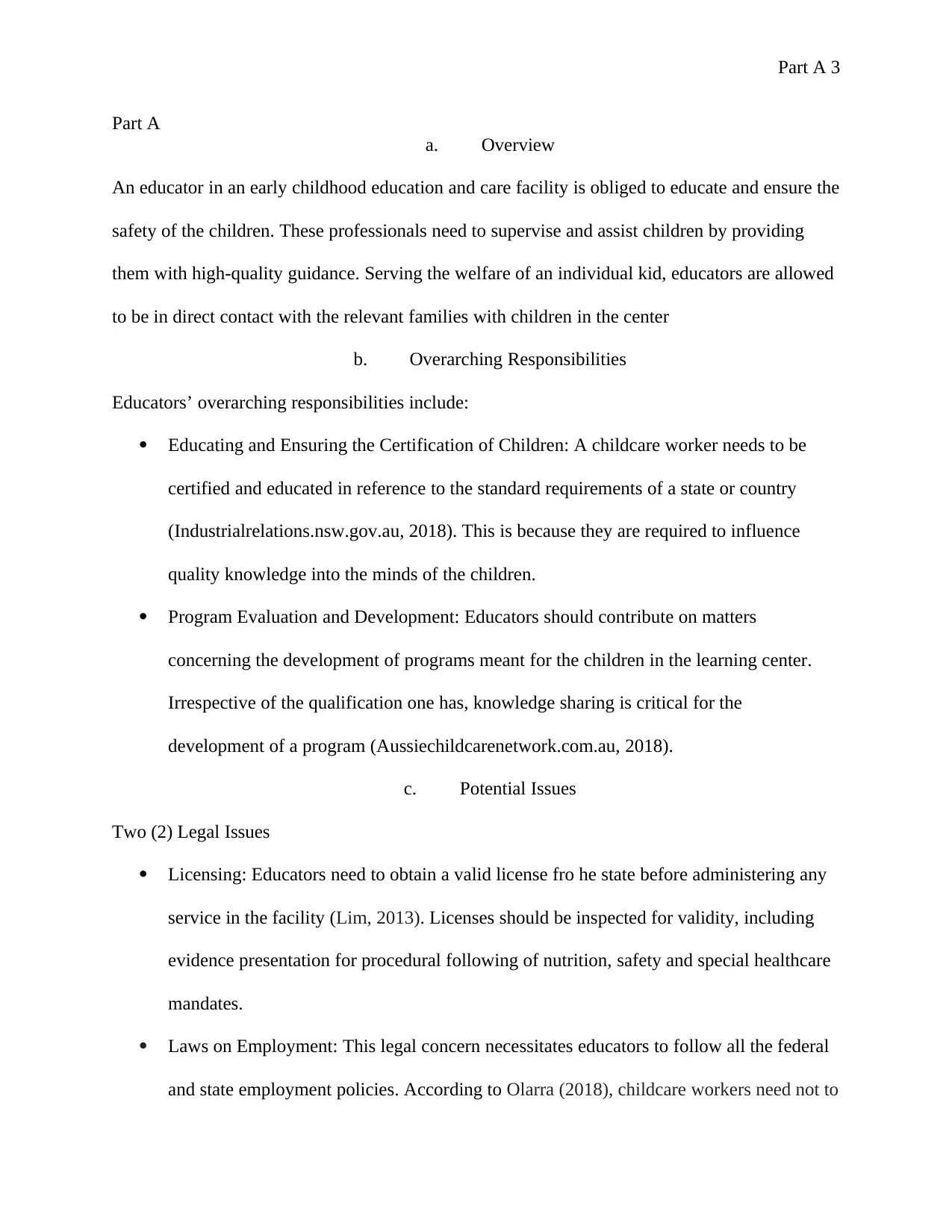
Part A 3
Part A
a. Overview
An educator in an early childhood education and care facility is obliged to educate and ensure the
safety of the children. These professionals need to supervise and assist children by providing
them with high-quality guidance. Serving the welfare of an individual kid, educators are allowed
to be in direct contact with the relevant families with children in the center
b. Overarching Responsibilities
Educators’ overarching responsibilities include:
Educating and Ensuring the Certification of Children: A childcare worker needs to be
certified and educated in reference to the standard requirements of a state or country
(Industrialrelations.nsw.gov.au, 2018). This is because they are required to influence
quality knowledge into the minds of the children.
Program Evaluation and Development: Educators should contribute on matters
concerning the development of programs meant for the children in the learning center.
Irrespective of the qualification one has, knowledge sharing is critical for the
development of a program (Aussiechildcarenetwork.com.au, 2018).
c. Potential Issues
Two (2) Legal Issues
Licensing: Educators need to obtain a valid license fro he state before administering any
service in the facility (Lim, 2013). Licenses should be inspected for validity, including
evidence presentation for procedural following of nutrition, safety and special healthcare
mandates.
Laws on Employment: This legal concern necessitates educators to follow all the federal
and state employment policies. According to Olarra (2018), childcare workers need not to
Part A
a. Overview
An educator in an early childhood education and care facility is obliged to educate and ensure the
safety of the children. These professionals need to supervise and assist children by providing
them with high-quality guidance. Serving the welfare of an individual kid, educators are allowed
to be in direct contact with the relevant families with children in the center
b. Overarching Responsibilities
Educators’ overarching responsibilities include:
Educating and Ensuring the Certification of Children: A childcare worker needs to be
certified and educated in reference to the standard requirements of a state or country
(Industrialrelations.nsw.gov.au, 2018). This is because they are required to influence
quality knowledge into the minds of the children.
Program Evaluation and Development: Educators should contribute on matters
concerning the development of programs meant for the children in the learning center.
Irrespective of the qualification one has, knowledge sharing is critical for the
development of a program (Aussiechildcarenetwork.com.au, 2018).
c. Potential Issues
Two (2) Legal Issues
Licensing: Educators need to obtain a valid license fro he state before administering any
service in the facility (Lim, 2013). Licenses should be inspected for validity, including
evidence presentation for procedural following of nutrition, safety and special healthcare
mandates.
Laws on Employment: This legal concern necessitates educators to follow all the federal
and state employment policies. According to Olarra (2018), childcare workers need not to
⊘ This is a preview!⊘
Do you want full access?
Subscribe today to unlock all pages.

Trusted by 1+ million students worldwide
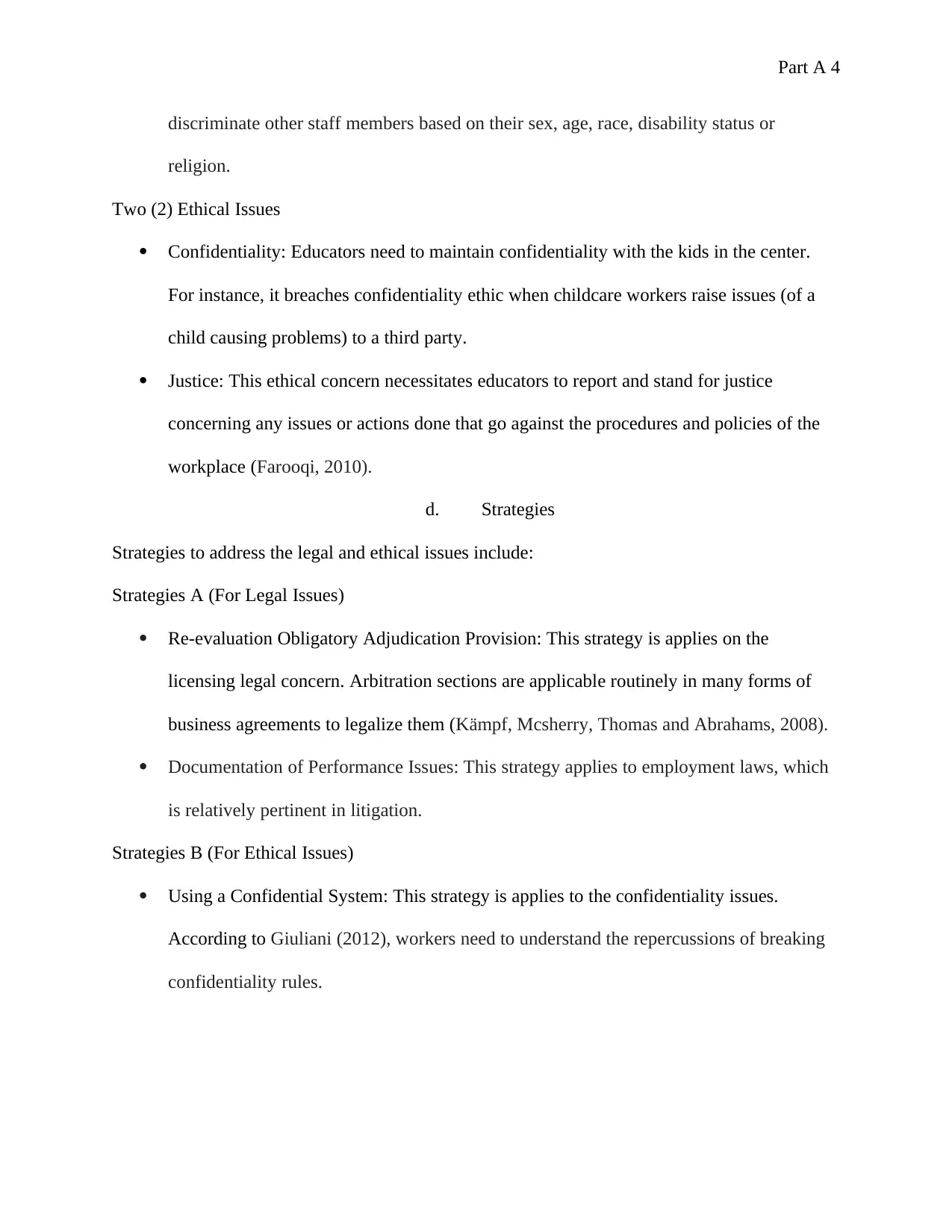
Part A 4
discriminate other staff members based on their sex, age, race, disability status or
religion.
Two (2) Ethical Issues
Confidentiality: Educators need to maintain confidentiality with the kids in the center.
For instance, it breaches confidentiality ethic when childcare workers raise issues (of a
child causing problems) to a third party.
Justice: This ethical concern necessitates educators to report and stand for justice
concerning any issues or actions done that go against the procedures and policies of the
workplace (Farooqi, 2010).
d. Strategies
Strategies to address the legal and ethical issues include:
Strategies A (For Legal Issues)
Re-evaluation Obligatory Adjudication Provision: This strategy is applies on the
licensing legal concern. Arbitration sections are applicable routinely in many forms of
business agreements to legalize them (Kämpf, Mcsherry, Thomas and Abrahams, 2008).
Documentation of Performance Issues: This strategy applies to employment laws, which
is relatively pertinent in litigation.
Strategies B (For Ethical Issues)
Using a Confidential System: This strategy is applies to the confidentiality issues.
According to Giuliani (2012), workers need to understand the repercussions of breaking
confidentiality rules.
discriminate other staff members based on their sex, age, race, disability status or
religion.
Two (2) Ethical Issues
Confidentiality: Educators need to maintain confidentiality with the kids in the center.
For instance, it breaches confidentiality ethic when childcare workers raise issues (of a
child causing problems) to a third party.
Justice: This ethical concern necessitates educators to report and stand for justice
concerning any issues or actions done that go against the procedures and policies of the
workplace (Farooqi, 2010).
d. Strategies
Strategies to address the legal and ethical issues include:
Strategies A (For Legal Issues)
Re-evaluation Obligatory Adjudication Provision: This strategy is applies on the
licensing legal concern. Arbitration sections are applicable routinely in many forms of
business agreements to legalize them (Kämpf, Mcsherry, Thomas and Abrahams, 2008).
Documentation of Performance Issues: This strategy applies to employment laws, which
is relatively pertinent in litigation.
Strategies B (For Ethical Issues)
Using a Confidential System: This strategy is applies to the confidentiality issues.
According to Giuliani (2012), workers need to understand the repercussions of breaking
confidentiality rules.
Paraphrase This Document
Need a fresh take? Get an instant paraphrase of this document with our AI Paraphraser
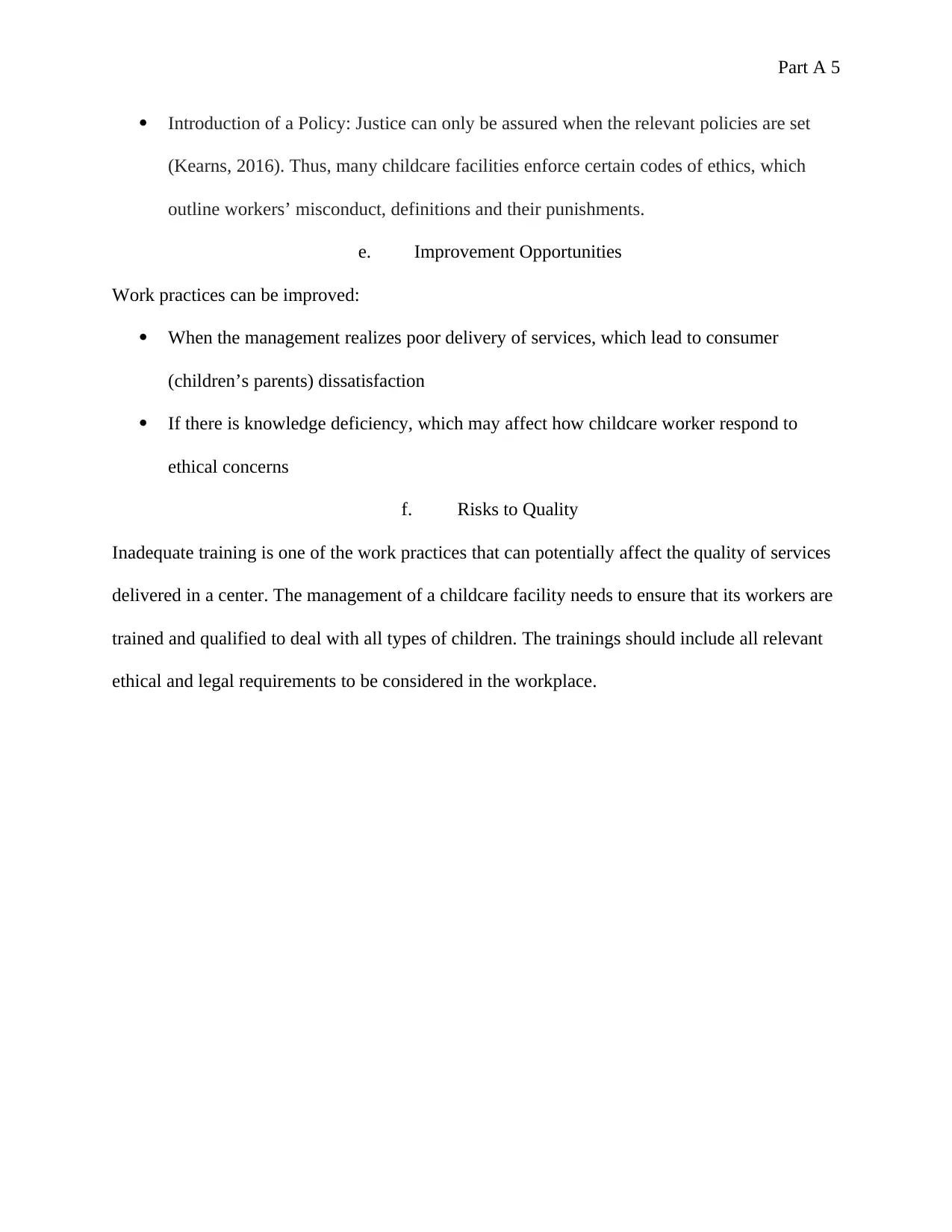
Part A 5
Introduction of a Policy: Justice can only be assured when the relevant policies are set
(Kearns, 2016). Thus, many childcare facilities enforce certain codes of ethics, which
outline workers’ misconduct, definitions and their punishments.
e. Improvement Opportunities
Work practices can be improved:
When the management realizes poor delivery of services, which lead to consumer
(children’s parents) dissatisfaction
If there is knowledge deficiency, which may affect how childcare worker respond to
ethical concerns
f. Risks to Quality
Inadequate training is one of the work practices that can potentially affect the quality of services
delivered in a center. The management of a childcare facility needs to ensure that its workers are
trained and qualified to deal with all types of children. The trainings should include all relevant
ethical and legal requirements to be considered in the workplace.
Introduction of a Policy: Justice can only be assured when the relevant policies are set
(Kearns, 2016). Thus, many childcare facilities enforce certain codes of ethics, which
outline workers’ misconduct, definitions and their punishments.
e. Improvement Opportunities
Work practices can be improved:
When the management realizes poor delivery of services, which lead to consumer
(children’s parents) dissatisfaction
If there is knowledge deficiency, which may affect how childcare worker respond to
ethical concerns
f. Risks to Quality
Inadequate training is one of the work practices that can potentially affect the quality of services
delivered in a center. The management of a childcare facility needs to ensure that its workers are
trained and qualified to deal with all types of children. The trainings should include all relevant
ethical and legal requirements to be considered in the workplace.
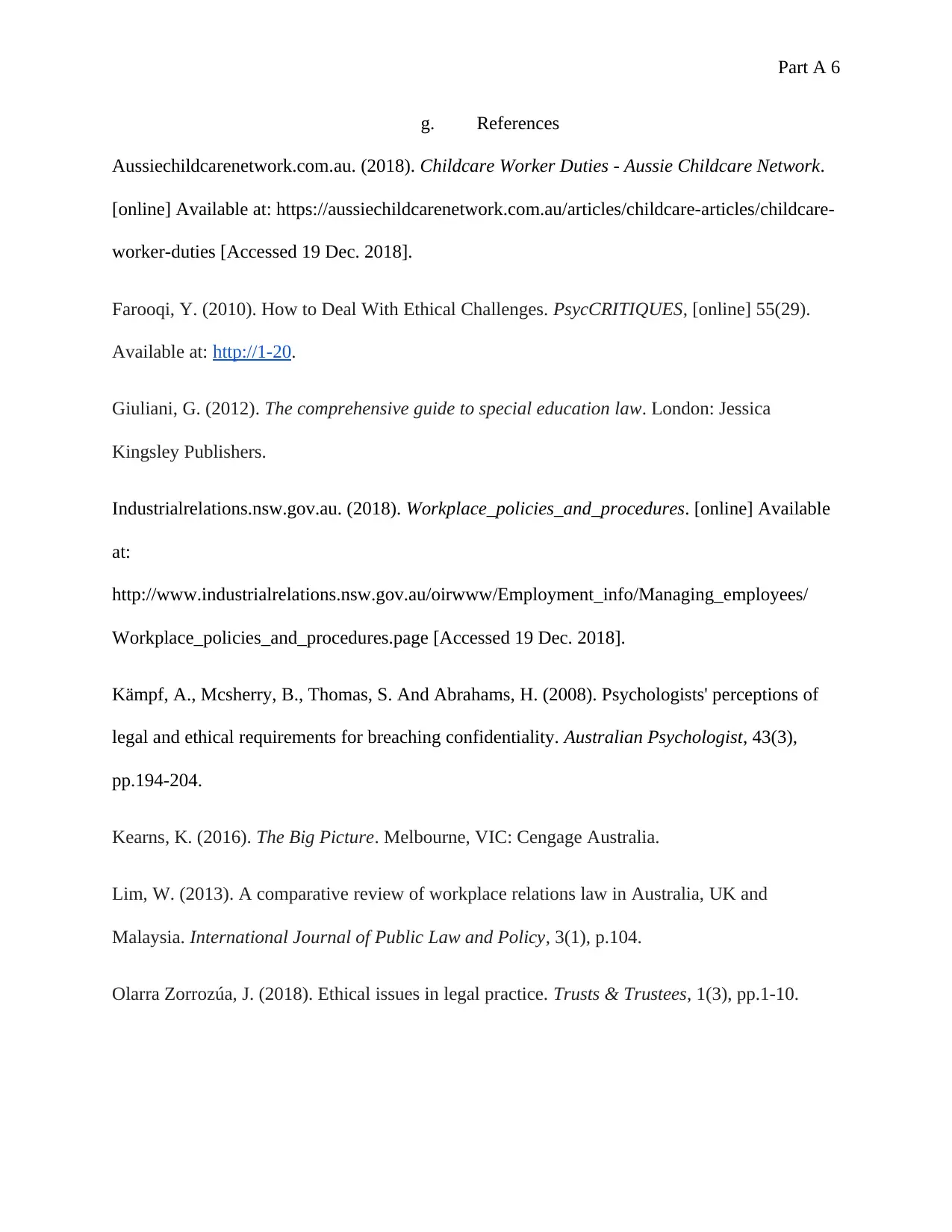
Part A 6
g. References
Aussiechildcarenetwork.com.au. (2018). Childcare Worker Duties - Aussie Childcare Network.
[online] Available at: https://aussiechildcarenetwork.com.au/articles/childcare-articles/childcare-
worker-duties [Accessed 19 Dec. 2018].
Farooqi, Y. (2010). How to Deal With Ethical Challenges. PsycCRITIQUES, [online] 55(29).
Available at: http://1-20.
Giuliani, G. (2012). The comprehensive guide to special education law. London: Jessica
Kingsley Publishers.
Industrialrelations.nsw.gov.au. (2018). Workplace_policies_and_procedures. [online] Available
at:
http://www.industrialrelations.nsw.gov.au/oirwww/Employment_info/Managing_employees/
Workplace_policies_and_procedures.page [Accessed 19 Dec. 2018].
Kämpf, A., Mcsherry, B., Thomas, S. And Abrahams, H. (2008). Psychologists' perceptions of
legal and ethical requirements for breaching confidentiality. Australian Psychologist, 43(3),
pp.194-204.
Kearns, K. (2016). The Big Picture. Melbourne, VIC: Cengage Australia.
Lim, W. (2013). A comparative review of workplace relations law in Australia, UK and
Malaysia. International Journal of Public Law and Policy, 3(1), p.104.
Olarra Zorrozúa, J. (2018). Ethical issues in legal practice. Trusts & Trustees, 1(3), pp.1-10.
g. References
Aussiechildcarenetwork.com.au. (2018). Childcare Worker Duties - Aussie Childcare Network.
[online] Available at: https://aussiechildcarenetwork.com.au/articles/childcare-articles/childcare-
worker-duties [Accessed 19 Dec. 2018].
Farooqi, Y. (2010). How to Deal With Ethical Challenges. PsycCRITIQUES, [online] 55(29).
Available at: http://1-20.
Giuliani, G. (2012). The comprehensive guide to special education law. London: Jessica
Kingsley Publishers.
Industrialrelations.nsw.gov.au. (2018). Workplace_policies_and_procedures. [online] Available
at:
http://www.industrialrelations.nsw.gov.au/oirwww/Employment_info/Managing_employees/
Workplace_policies_and_procedures.page [Accessed 19 Dec. 2018].
Kämpf, A., Mcsherry, B., Thomas, S. And Abrahams, H. (2008). Psychologists' perceptions of
legal and ethical requirements for breaching confidentiality. Australian Psychologist, 43(3),
pp.194-204.
Kearns, K. (2016). The Big Picture. Melbourne, VIC: Cengage Australia.
Lim, W. (2013). A comparative review of workplace relations law in Australia, UK and
Malaysia. International Journal of Public Law and Policy, 3(1), p.104.
Olarra Zorrozúa, J. (2018). Ethical issues in legal practice. Trusts & Trustees, 1(3), pp.1-10.
⊘ This is a preview!⊘
Do you want full access?
Subscribe today to unlock all pages.

Trusted by 1+ million students worldwide
1 out of 6
Related Documents
Your All-in-One AI-Powered Toolkit for Academic Success.
+13062052269
info@desklib.com
Available 24*7 on WhatsApp / Email
![[object Object]](/_next/static/media/star-bottom.7253800d.svg)
Unlock your academic potential
Copyright © 2020–2026 A2Z Services. All Rights Reserved. Developed and managed by ZUCOL.





